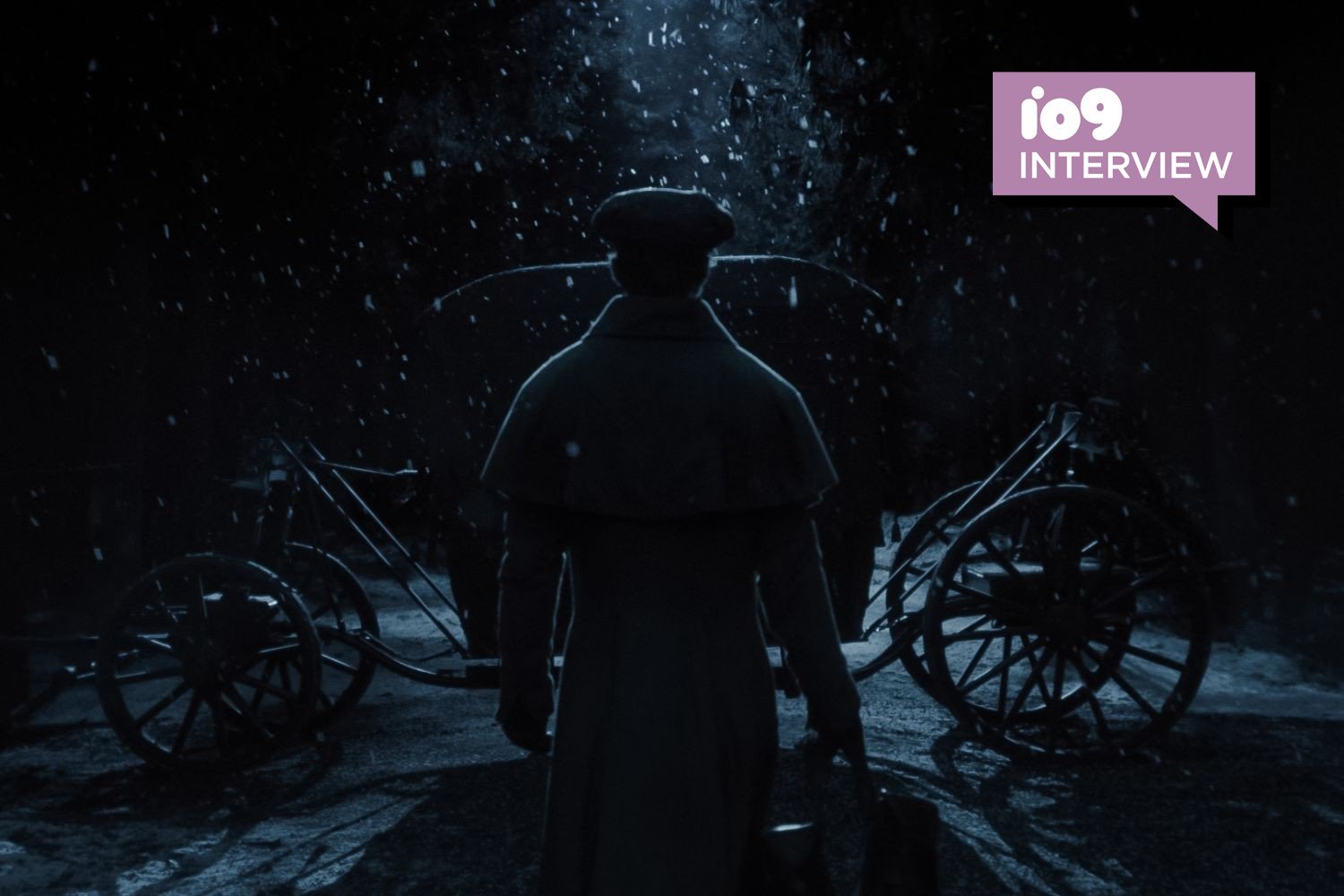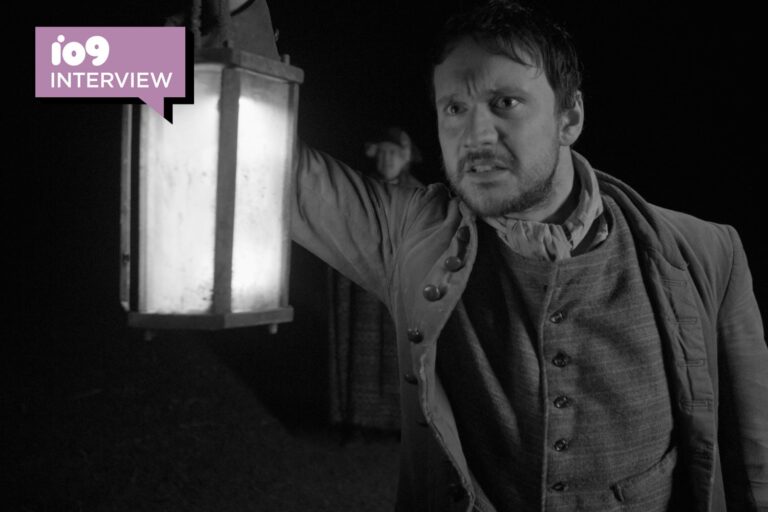Robert Eggers on Why Nosferatu Is a Great Twisted Christmas Movie
This Christmas, there are many options at your local cineplex. There are lions, hedgehogs, witches, demigods, and more. But the coolest choice, the sexiest choice, is the vampire. This week, filmmaker Robert Eggers unleashes Nosferatu, a long-awaited, highly anticipated film inspired by the iconic 1922 film by F. W. Murnau. Bill Skarsgård stars as the sinister Count Orlok, who creeps his way into the lives of newlyweds Thomas and Ellen (Nicholas Hoult and Lily-Rose Depp).
It’s a dark, atmospheric, but entertaining film from a filmmaker who has, even with just three films under his belt, developed a very well-earned reputation. With The Witch, The Lighthouse, and The Northman, Eggers has cemented himself as a meticulous, visual filmmaker with a flair for the historic and gothic. Nosferatu is maybe his most “Eggers” film yet, but it’s also coming out at Christmas, a very commercial time.
io9 spoke to Eggers via video chat a few weeks back and that struggle between art and product is where our conversation began.
This interview was edited for length and clarity.

Germain Lussier, io9: I love your films because not only are they entertaining, they’re so meticulous, beautiful, and often just weird. I’m wondering, at any point in the process do you wrestle between artistic impulses and commercial viability?
Robert Eggers: Well, this film from the get-go was intended to be my most “approachable movie.” Maybe you know this and maybe you don’t but the main creative producer on this is Chris Columbus of Home Alone and Harry Potter fame. And Chris has been a mentor to me since we met during post-production of The Witch. But he knows that we are very different filmmakers and that’s part of why we get along creatively, and I think it’s such a nice match. And Jarin Blaschke, my DP and I, we meticulously storyboard the movies. Well, we work with a storyboard artist, but we meticulously plan all the shots. And Chris was combing through the storyboards, looking at them all very carefully, and would occasionally say, “Where’s this story beat that’s in your script? You need this here.” And Chris, being a master of orthodox Hollywood storytelling, was often like an antidote to me and Jarin’s arty-farty inclinations to tell this story as well as I wanted to, because he was there to make this the best Robert Eggers movie it could be, not to Chris Columbus-ify it. But also, with this film, I had incredible support from Focus Features, who gave me tons of creative control.
io9: And I think we get a hint that this was supposed to be more commercial because a year ago when the film was announced, Focus was like “Robert Eggers, Nosferatu, coming out Christmas Day.” And that’s always kind of a big deal, a Christmas release. Were you part of that conversation, and does a prime release date like that change your thinking at all?
Eggers: Yeah, I mean, I was part of the conversation, but ultimately that was the date that they pitched to me, and I embraced it with a lot of excitement. Obviously the film takes place, by the midpoint, around Christmas time, and there’s a Christmas tree, and there’s conversations about Christmas, and there’s a scene where there’s a music box that plays “O Tannenbaum” and it originally was playing like a Mozart piece, and when we got the Christmas release date, I was like, “Let’s put ‘O Tannenbaum’ in there.”

io9: That’s awesome. Now, Willem Dafoe is in the film whom you’ve worked before. Clearly he’s incredible but he also has some history with this world being in Shadow of the Vampire. Did you guys discuss that before and how much did those conversations come into this movie at all?
Eggers: I love that film, and it’s a great movie, but they’re sort of unrelated. But obviously, we both recognize it’s cool for audience members who are in the know to know that he is sort of hunting himself in this movie.
io9: Is there anything in this film you’re able to accomplish that you’re particularly proud of, or that was particularly difficult, either technically in terms of story and tone?
Eggers: I mean, there’s a lot of things. One thing, for me personally, I don’t know how audiences will experience it, but I feel like the long unbroken takes, the “owners” in this film, are a little less heavy-handed and a little bit more invisible. That’s my impression, maybe I’m wrong. I’m very proud of the atmosphere of the cemetery. That was something I really, really, really wanted. One of the very few things that Focus was wringing their hands about was my insistence to never shoot in anything but gloomy weather because we’re standing around waiting for a cloud cover and that can be very tense. But the graveyard was an example of the necessity of that way of working. And the Transylvanian village scene was incredibly complicated to cast and to costume and to block. There are some actors, mostly non-actors, some professional dancers, and everyone speaking a different language from a different country. It was very complicated, but I like how that turned out.

io9: That’s so cool. I also know you love to research and that plays a big part in all your films. How deep did you dive into the Count’s backstory, both for yourself and for Bill? Do you guys know how and when he changed, how he developed his powers, or is that stuff kind of superfluous?
Eggers: No, no. In trying to make this story my own—this story that’s been told so many times—I wrote a novella when trying to break the script and the novella had lots of backstories to learn about different characters. And the epilogue was a long backstory of Orlok that I gave to Bill as part of his preparation. That will never be shared because the mystery of the enigma is better for an audience, but it was important for Bill to have that history.
io9: So never a thought to put that in at all?
Eggers: No, I mean, as much as this fleshes things out that aren’t fleshed out in the Murnau film, a certain degree of mystery is important.
io9: This is a story you’ve been wanting to tell for a long time and even got close at some point. What about this version now is different from a version you may have made after The Witch or earlier in your career?
Eggers: You know, my intentions have not really changed once I wrote that novella and once I broke that script. The script has gotten tighter and just more honed, but my “vision” for what the movie would be has not changed. But I’m glad it took a long time. I’ve grown a lot as a person, certainly as a filmmaker. My collaborations with my creative head of departments have become even more fluid and we’re more extensions of each other. And also I ended up with this completely fantastic cast.

io9: Oh a fantastic cast, which is something that makes all the vampire movies unique. It’s also one of those genres that, you know, we have vampire comedies, we have vampire horror, vampire drama, we have everything. What is it about the genre that makes it so malleable and what do you love about it?
Eggers: Yeah, I mean, it is crazy how malleable the vampire is and how there’s room for Anne Rice and room for Blade and room for Count Chocula and room for all this stuff. But I’ve been asked this question a lot, but the best that I can come up with is sex and death. It’s a combination of sex and death.
io9: Last thing, recently Focus, revealed a $20,000 Nosferatu coffin bed, which I’m sure you know. Do you have one? Do you want one? What do you say to someone who buys one? What are your thoughts?
Eggers: Um. [Laughs, thinks, pauses]. “Congratulations.”
io9: [Laughs] Exactly. Well, congratulations to you, sir, on a fantastic, beautiful movie.
Nosferatu is in theaters December 25.
Want more io9 news? Check out when to expect the latest Marvel, Star Wars, and Star Trek releases, what’s next for the DC Universe on film and TV, and everything you need to know about the future of Doctor Who.







